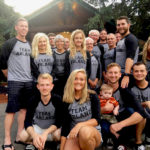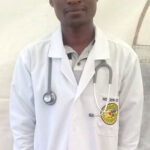
Joe Lickteig of St. Mary Parish in Pella has made it his mission to ensure that persons with disabilities in the community have opportunities to work and to live full lives in their home community. He and his fellow Knights of Columbus devote hours and energy to raising funds and awareness about the Campaign for Persons with Intellectual Disabilities (CPID). The Knights also call on local businesses to consider employment of persons with intellectual (developmental) disabilities.
Joe’s inspiration comes from his late sister, Julie Ann, a person with a developmental disability whose family made sure she attended Mass, school and had the opportunity to perform a job suited to her abilities. As a child, he occasionally felt embarrassed during Mass when Julie Ann talked aloud, saying hi to her mom who was serving as a lector. He remembered, though, how the parish accepted Julie Ann.
This month is National Developmental Disabilities Awareness Month, and the Iowa Developmental Disabilities (Iowa DD Council) notes that 48,000 Iowans have a developmental disability. This is a mental or physical disability acquired before the age of 22. The Iowa DD Council “aims to create change with and for persons with developmental disabilities so they can live, work, learn, and play in the community of their choosing.” As persons of faith, we ought to add the phrase “celebrate their faith” to the list.
How many of our parishes truly welcome persons with developmental disabilities in their liturgies, parish activities and reach out to them in their daily walk in life in the community at large? “Night to Shine,” a special needs prom, is a wonderful example of some of our parishes, working with other churches, to celebrate people with developmental, physical or mental disabilities. Do we start or stop there?
A Pastoral Statement of U.S. Bishops on Persons with Disabilities, published 44 years ago and updated 24 years ago, provides guidance still applicable today. While pastoral leaders may be aware of this document and the timeless principles contained within it, Catholics in the pews and in the community should become familiar with it as well.
“What disabled individuals need, first of all, is acceptance in this difference that can neither be denied nor overlooked,” the bishops said in their pastoral statement. “No acts of charity or justice can be of lasting value to persons with disabilities unless they are informed by a sincere understanding love that penetrates the wall of strangeness and affirms the common humanity underlying all distinction.”
The bishops advise, “The leaders and the general membership of the Church must educate themselves to appreciate fully the contribution persons with disabilities can make to the Church’s spiritual life.” For example, a parish could invite a family of an individual with developmental disabilities to give a short talk about their loved ones’ needs and interests. When recruiting volunteers to serve in various ministries, consider including special needs ministry in the parish’s commissions.
“At the very least, we must undertake forms of evangelization that speak to the particular needs of persons with disabilities, make those liturgical adaptations that promote their active participation, and provide help and services that reflect our loving concerns for those with serious problems,” the bishops said.
Deacon Jeff Schuetzle of Jesus Christ, Prince of Peace Parish in Clinton has ministered for years with the L’Arche Clinton community, which serves individuals with developmental disabilities. The COVID-19 pandemic has curtailed that ministry but Deacon Schuetzle realizes the importance of serving the Catholic members of L’Arche for whom the Mass and their faith community are essential.
Making Brenda, Mark and Dan feel welcome at the Eucharist — and helping their non-Catholic staff to feel welcome — is essential. Mark, for instance, cannot consume even a fragment of the body of Christ. The parish arranged for Mark to receive the precious blood of Christ from a cup reserved for Mark. That requires regular communication with all the ministers at Mass that day.
Welcoming persons with developmental disabilities into our faith community also requires us to seek their input. It is possible for a person with a developmental disability to serve in a ministry such as lector or usher. Recognize an individual’s interest and talents. An invitation to do so goes a long way.
Joe Lickteig has another mission in mind, after receiving a letter from a business owner who is not Catholic. The business owner said he appreciated the efforts of the Knights of Columbus but pointed out that he and his wife attend separate Sunday services because no church in town can accommodate their son with significant disabilities. Joe plans to bring up the topic at the next Knights of Columbus meeting.
Read the bishops’ pastoral statement (https://tinyurl.com/489bjx47). More importantly, read the practical “Guidelines for the Celebration of the Sacraments with Persons with Disabilities Revised Edition” (https://tinyurl.com/yckhvxys). Visit the National Catholic Partnership on Disabilities website at ncpd.org to learn more about welcoming steps to take.
Barb Arland-Fye, Editor
arland-fye@davenportdiocese.org











